

Colour my world. Why you really should keep a journal, no matter how cheesy that sounds. If you've spent any significant time reading books or articles on the "science of happiness", you'll have encountered what I've long thought of as the Cheesiness Problem.

It's an inescapable fact that some of the most thoroughly evidence-backed techniques for enhancing one's mood are also the most excruciatingly embarrassing – the sorts of things that those of us who imagine ourselves to be rational, sceptical types would never dream of confessing to. This is awkward, since (as I've written before) it means having to choose between maintaining a pose of sardonic detachment or doing what actually works. For me, the most vivid example is keeping a gratitude journal. On the one hand, it really helps.
On the other hand – well, come on. Anyway, this problem just got worse. Researchers led by Elizabeth Broadbent, a senior lecturer in health psychology at the University of Auckland in New Zealand, studied 49 healthy senior citizens, aged 64 to 97. How to Lose Your Mind and Create a New One. Security. People taught synaesthesia learn to read in colour - life - 18 November 2014. Brain training for synaesthesia – the condition where you mix up sensory information - doesn't yet exist, but it may be just around the corner.
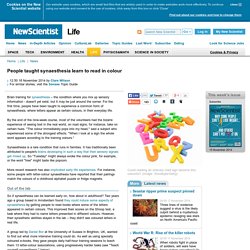
David Lynch on Where Ideas Come From and the Fragmentary Nature of Creativity. Alice in Quantumland: A Charming Illustrated Allegory of Quantum Mechanics by a CERN Physicist. By Maria Popova Down the rabbit hole of antimatter, or how to believe six impossible things about gender stereotypes before breakfast.
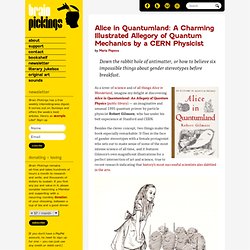
As a lover of science and of all things Alice in Wonderland, imagine my delight at discovering Alice in Quantumland: An Allegory of Quantum Physics (public library) — an imaginative and unusual 1995 quantum primer by particle physicist Robert Gilmore, who has under his belt experience at Stanford and CERN. Besides the clever concept, two things make the book especially remarkable: It flies in the face of gender stereotypes with a female protagonist who sets out to make sense of some of the most intense science of all time, and it features Gilmore’s own magnificent illustrations for a perfect intersection of art and science, true to recent research indicating that history’s most successful scientists also dabbled in the arts. Gilmore writes in the preface: In the first half of the twentieth century, our understanding in the Universe was turned upside down. Learning New Words Activates The Same Brain Regions As Sex And Drugs.
While it doesn’t get much better than sex and drugs for many out there, new research has found that simply learning a new word can spark up the same reward circuits in the brain that are activated during pleasurable activities such as these.
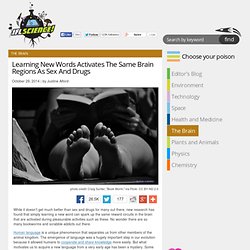
No wonder there are so many bookworms and scrabble addicts out there. Human language is a unique phenomenon that separates us from other members of the animal kingdom. The emergence of language was a hugely important step in our evolution because it allowed humans to cooperate and share knowledge more easily. Neil Gaiman Reimagines Hansel & Gretel, with Gorgeous Black-and-White Illustrations by Italian Graphic Artist Lorenzo Mattotti. Neurodiversity Rewires Conventional Thinking About Brains. Illustration: Mark Weaver In the late 1990s, a sociologist named Judy Singer—who is on the autism spectrum herself—invented a new word to describe conditions like autism, dyslexia, and ADHD: neurodiversity.
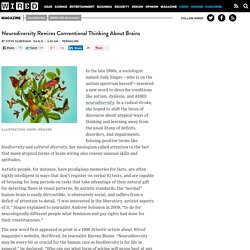
In a radical stroke, she hoped to shift the focus of discourse about atypical ways of thinking and learning away from the usual litany of deficits, disorders, and impairments. Echoing positive terms like biodiversity and cultural diversity, her neologism called attention to the fact that many atypical forms of brain wiring also convey unusual skills and aptitudes.
Autistic people, for instance, have prodigious memories for facts, are often highly intelligent in ways that don’t register on verbal IQ tests, and are capable of focusing for long periods on tasks that take advantage of their natural gift for detecting flaws in visual patterns. When Power Goes To Your Head, It May Shut Out Your Heart. Neuroscientists have found evidence to suggest feeling powerful dampens a part of our brain that helps with empathy.
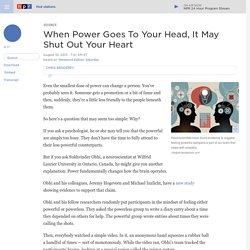
Vladgrin/istockphoto.com hide caption toggle caption Vladgrin/istockphoto.com Neuroscientists have found evidence to suggest feeling powerful dampens a part of our brain that helps with empathy. Synesthesia: Some People Really Can Taste The Rainbow : The Salt. Colour my world. Synesthesia overview. Experience: I feel other people's pain. When I watch a film, I feel as if I'm in starring in it.
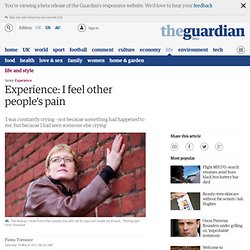
The Girl With The Dragon Tattoo was horrific. My friend invited me to see it, and I had no idea what it was about – I normally try to avoid dramas and thrillers. When the character Salander was tortured, I felt as if my body was being beaten; I could physically feel the sensation of being attacked. It's the same with emotions. If someone is happy, it's like hearing an orchestra and I feel extreme excitement and joy. My earliest memory of mirror-touch is standing in my parents' garden in South Africa, aged six, watching butcher birds hang mice on the wire fence. Eventually, she took me to the doctors, but they didn't have any answers.
Synesthesia.